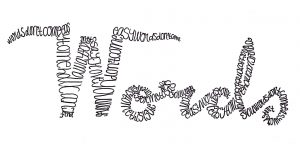From Robot to Airy-Fairy to Cyberspace – 10 Beautiful Words Coined by Famous Writers
 If you look at the number of words in the English you’ll find that estimates vary between 500,000 and just over 2 million, depending on how you count them.
If you look at the number of words in the English you’ll find that estimates vary between 500,000 and just over 2 million, depending on how you count them.
Although most educated people will use no more than 20,000 words or so, this is still staggering amount. Indeded on closer analysis you will find that some of these words were simply “made up” by various authors at one time or another but they’ve proved so popular that they’ve entered our everyday lexicon.
They’ve become so much a part of the English language that their literary origins have often been forgotten. In this article we look at 10 words which were simply invented by their authors and which we seem to have embraced wholeheartedly into the English language.
Robot
Robot – a machine that resembles a human and does mechanical, routine tasks on command.
The word Robot was first coined by Czech writer Karel Čapek in his 1921 work Rossum’s Universal Robots. Kopeck took the Czech term for “serf labor” and adopted it to the animatrons that we think of today. In 1941, Isaac Asimov invented the words robotic and robotics after Čapek’s robot.
Quark
Quark – a type of elementary particle and a fundamental constituent of matter.
The existence of the sub-atomic partcle , later named as Quark, was first theorized by Murray Gell-Mann and George Zweig in 1964.
For some time, Gell-Mann was undecided on an actual spelling for the term he intended to coin, until he found the word quark in James Joyce’s book Finnegans Wake:
–Three quarks for Muster Mark!
Sure he hasn’t got much of a bark
And sure any he has it’s all beside the mark.
— James Joyce, Finnegans Wake
Airy-Fairy
Airy-Fairy – not practical or not based on the situation as it really is;lacking substance or purpose.
Alfred Tennyson was poet laureate after William Wordsworth and one of the most popular English poets in literature.
The term airy-fairy comes from his 1830 poem entitled “Lilian” about unrequited love.
“Lilian”
I.
AIRY, fairy Lilian,
Flitting, fairy Lilian,
When I ask her if she love me,
Claps her tiny hands above me,
Laughing all she can;
She’ll not tell me if she love me,
Cruel little Lilian.
II.
When my passion seeks
Pleasance in love-sighs,
She, looking thro’ and thro’ me
Thoroughly to undo me,
Smiling, never speaks:
So innocent-arch, so cunning-simple,
From beneath her gathered wimple
Glancing with black-beaded eyes,
Till the lightning laughters dimple
The baby-roses in her cheeks;
Then away she flies.
III.
Prythee weep, May Lilian!
Gaiety without eclipse
Wearieth me, May Lilian;
Thro’ my very heart it thrilleth
When from crimson-threaded lips
Silver-treble laughter trilleth:
Prythee weep, May Lilian!
IV.
Praying all I can,
If prayers will not hush thee,
Airy Lilian,
Like a rose-leaf I will crush thee,
Fairy Lilian.
from Through the Looking-Glass, and What Alice Found There (1871)
Scaredy-Cat
Scaredy-Cat – A timid person; a coward.
Scaredy-cat was first coined by U.S. author, Dorothy Parker in 1933 in her short story “The Waltz” with this line:
“Oh, yes, do let’s dance together. It’s so nice to meet a man who isn’t scaredy-cat about catching my beri-beri.”.
Stentorian
Stentorian – using a very loud voice, or (of a voice) very loud.
In Greek mythology, Stentor was a herald of the Greek forces during the Trojan War. He is mentioned briefly in Homer’s Iliad, in which Hera tells Stentor to encourage the Greeks to fight; Homer says his “voice was as powerful as fifty voices of other men“.
Bedazzled
Bedazzled – to be irresistibly enchanted, dazed or pleased.
Bedazzled was a word which Shakespeare debuts in The Taming of the Shrew, Act IV, Scene V:
“Pardon, old father, my mistaking eyes, that have been so bedazzled with the sun that everything I look on seemeth green.” – Katherina.
Freelance
Freelance – One who sells services to employers without a long-term commitment to any of them; An uncommitted independent, as in politics or social life.
The word is not recorded before Sir Walter Scott introduced it in Ivanhoe which, among other things, is often considered the first historic novel in the modern sense. Scott’s freelancers were mercenaries who pledged their loyalty and arms for a fee.
Cyberspace
Cyberspace – the realm of electronic communication;virtual reality.
Novelist William Gibson invented this word in a 1982 short story, but it became popular after the publication of his sci-fi novel Neuromancer in 1984. He described cyberspace as “a graphic representation of data abstracted from banks of every computer in the human system
Banana Republic
Banana Republic – A politically unstable, undemocratic and tropical nation whose economy is largely dependent on the export of a single limited-resource product, such as a fruit or a mineral.
The pejorative term was coined by O. Henry (William Sidney Porter) in his 1904 collection of short stories entitled Cabbages and Kings.
Cabbages and Kings is about a fictional country, Anchuria, inspired by Porter’s experiences in Honduras where he had lived for six months. In a chapter (short story), “The Admiral”, O.Henry refers to the nation as a “small maritime banana republic”; naturally, the fruit was the entire basis of its economy.
Co-ed
Co-ed – Short for co-education or any co-educational institution or system.
Louisa May Alcott wrote in her 1886 novel Jo’s Boys. “Never liked co-ed” The line is uttered by a boy named Adolphus “Dolly” Pettingill objecting to eating with girls.






